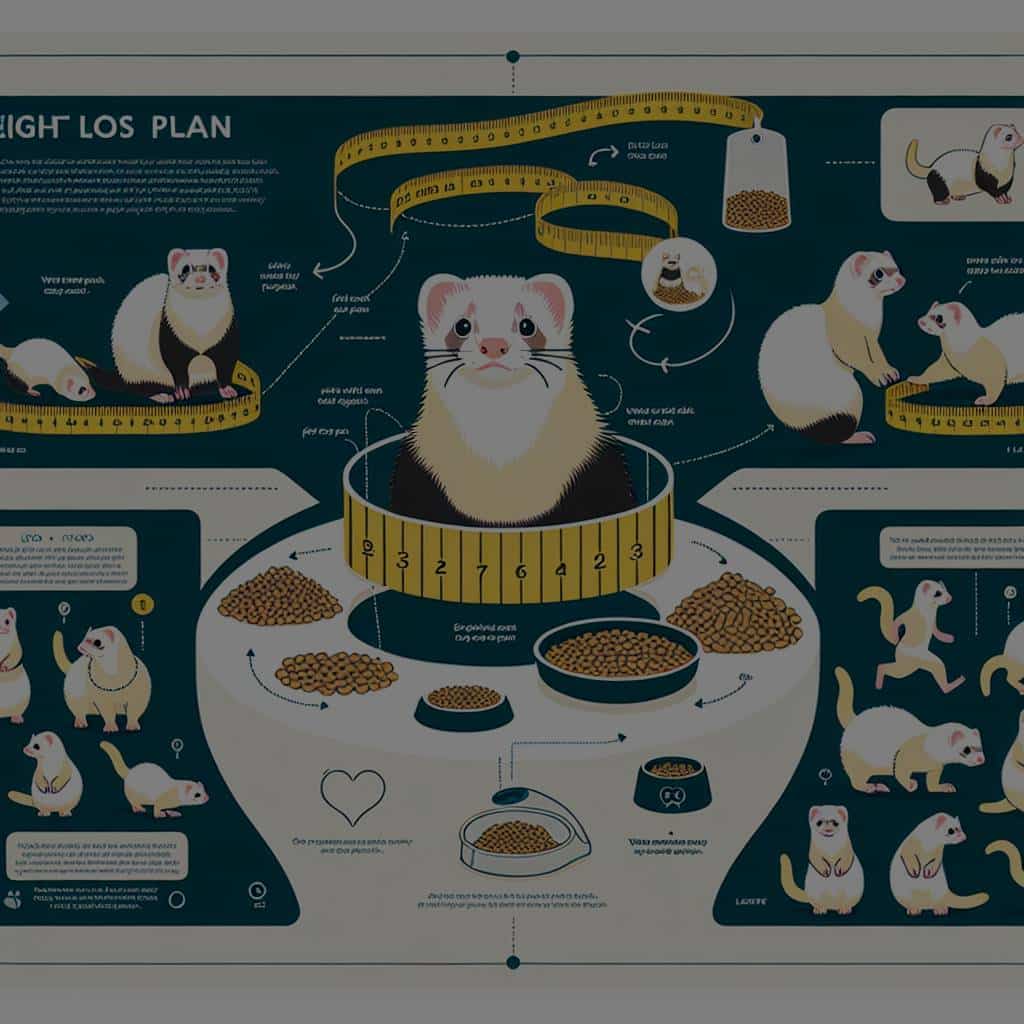In today’s modern society, the problem of obesity isn’t limited to humans–our pets are also susceptible. One pet you might not immediately associate with weight issues is the ferret. But just like dogs, cats, and even humans, ferrets are also at risk of becoming overweight. It’s crucial for their health and longevity to maintain a proper body weight.
The question is: How do you implement a weight loss plan for your overweight ferret? In this article, we will dive into this topic, discussing crucial aspects of ferret diets, their general health, and their unique needs.
Topic to read : How to Address Nighttime Anxiety in Elderly Dogs?
Recognizing an Overweight Ferret
Before you can help your ferret lose weight, you must first recognize when they are overweight. Ferrets are small animals, so even a little extra fat can significantly impact their health. So how can you tell if your ferret has packed on some extra pounds?
Firstly, ferrets should have a sleek and streamlined body shape. They should not have noticeable rolls or bulges of fat. You should be able to feel their ribcage and spine beneath a light layer of fat, but these should not be visible. If your pet has an overly rounded appearance or if their body feels hard when you stroke them, this could indicate that they are overweight.
Also to see : How to Properly Insulate an Outdoor Cat Shelter for Winter?
It’s also important to remember that ferrets, just like other animals, can gain weight due to health issues. For example, certain hormonal imbalances can lead to weight gain. If you notice a sudden change in your ferret’s weight or body shape, it’s crucial to consult with a veterinarian.
The Basics of a Ferret’s Diet
A ferret’s diet is a crucial aspect of their overall health and weight management. Ferrets are obligate carnivores, meaning their diet should be primarily composed of meat. High-protein and high-fat foods are essential for their health.
Ferrets require a regular diet of raw or cooked meat, including poultry, beef, or fish. They should also be given small amounts of fruits and vegetables, but these should only make up a tiny portion of their diet. Ferrets also need a constant supply of clean, fresh water to stay hydrated and maintain their health.
It’s worth noting that while ferrets need a diet high in protein and fat, the type of fat matters. Just like in human diets, not all fats are created equal. Ferrets need a balance of saturated and unsaturated fats. Saturated fats, found in animal products, are essential for their health, but too much can lead to weight gain and health issues. Unsaturated fats, on the other hand, can help maintain a healthy weight and prevent diseases.
Implementing a Weight Loss Plan
Once you’ve determined your pet ferret is overweight, it’s time to implement a weight loss plan. A weight loss plan for ferrets isn’t drastically different from those designed for other animals or even humans. It involves adjusting the animal’s diet and increasing their physical activity.
When adjusting your ferret’s diet, remember to do it gradually. An abrupt change in diet can stress your ferret and lead to health issues. Start by reducing the amount of high-fat foods in your ferret’s diet, while maintaining a high level of protein.
Additionally, consider introducing more fresh food into their diet. Fresh meats and a small amount of fruits and vegetables can help manage your ferret’s weight while supplying them with necessary nutrients.
Physical activity is another key aspect of a weight loss plan for ferrets. Ferrets are naturally active and playful animals. Encourage them to exercise by providing ample space for them to run and play.
A word of caution: ferrets are susceptible to heat stress, so avoid strenuous exercise during the hot months.
Managing Weight and Health in the Winter
Managing ferret weight can be especially challenging during winter. This is a time when ferrets, like many animals, naturally gain weight. Their bodies tend to store more fat for insulation against the cold.
During this time, it’s essential to maintain a balanced diet, but it may be necessary to slightly increase their food intake to provide extra energy for keeping warm. However, it’s also crucial to keep an eye on their weight and ensure that they don’t gain too much.
The type of food you provide during winter should still be high in protein. However, you might want to reduce the amount of high-fat foods in their diet to prevent excessive weight gain.
Lastly, despite the cold, don’t neglect your ferret’s need for physical activity. Indoor games and playtime can keep your ferret active and help manage their weight during the winter months.
In conclusion, maintaining a healthy weight for your ferret involves a balance of a proper diet and regular exercise. Always remember that each ferret is unique and may require a different approach to weight loss. If you are unsure, it’s always best to consult with a professional.
The Impact of Seasonal Weight Changes on Ferrets
As the seasons change, so too can the body weight of your pet ferret. It’s a common occurrence, known as seasonal weight changes, that can cause fluctuations in your ferret’s weight throughout the year. This is especially true during the summer and winter months when temperatures can hit extreme highs or lows.
During the summer months, ferrets usually lose weight. The high temperatures can suppress their appetite, leading to decreased consumption of ferret food. It’s vital to monitor this closely to ensure they don’t lose too much weight, as it can lead to health problems such as heart disease.
However, in the winter, the opposite can happen. Ferrets tend to gain weight as their bodies store more fat to keep them warm. This increase in body weight, if not managed properly, can lead to obesity and associated health risks.
To manage these seasonal weight changes, be observant of any significant increases or decreases in your ferret’s weight. Be prepared to adjust their diet and exercise routine accordingly. For instance, during the hot summers, you may need to encourage your ferret to eat more by offering high-quality, high-calorie foods.
Conversely, in the winter, you may need to monitor their food intake more closely to prevent excessive weight gain. Also, maintaining a regular exercise schedule can help manage your ferret’s body condition, regardless of the season.
Professional Guidance from PetMD Editorial on Weight Loss Plans for Ferrets
If you’re struggling with implementing a weight loss plan for your overweight ferret, consider getting professional advice. The PetMD Editorial offers numerous resources to help pet owners take care of their pets, including ferrets.
The PetMD Editorial recommends a balanced diet of high-protein, high-fat foods, and minimal fruits and vegetables for ferrets. They also emphasize the importance of regular exercise to keep your ferret active and prevent weight gain.
However, they also caution pet owners about abrupt changes in their ferret’s diet. It’s crucial to gradually introduce any changes to prevent stress and potential health issues.
One important point to remember from the PetMD Editorial is that each ferret is unique. Some ferrets may gain weight more quickly than others, some may be more susceptible to certain diseases, and others may react differently to changes in diet or exercise.
As such, it may take some trial and error to find the most effective weight loss plan for your ferret. If you’re unsure, don’t hesitate to consult with a veterinarian or pet nutritionist.
Remember, the goal isn’t just to make your ferret lose weight, but to ensure they maintain a healthy weight for their size and breed. This will help them enjoy a long, happy, and healthy life.
Conclusion
Ensuring your ferret maintains a healthy body weight is paramount for their overall health and longevity. By understanding the basics of a ferret’s diet, recognizing when they are overweight, and implementing a proper weight loss plan, you are taking significant steps towards ensuring your ferret’s health.
Remember, managing your ferret’s weight involves more than just controlling their diet. Regular exercise, monitoring seasonal weight changes, and periodically consulting with professionals or resources such as PetMD Editorial are all integral parts of a comprehensive weight management plan.
Lastly, always keep in mind that each ferret is unique. What works for one may not work for another. Therefore, be patient, be observant, and be ready to adapt your plans as necessary to keep your ferret at a healthy weight. Your ferret’s health and happiness are worth the effort.






